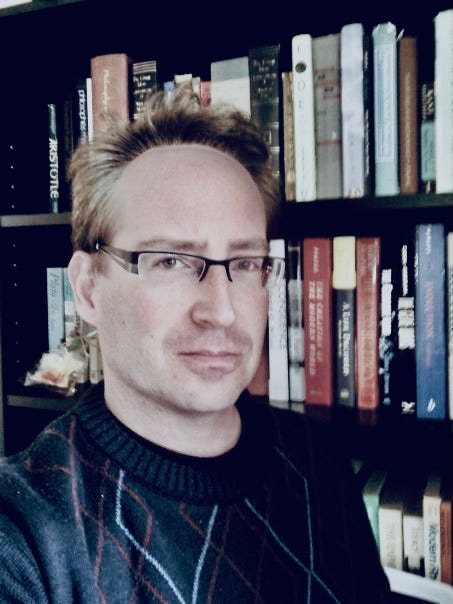Polymathic in his thinking, David Koepsell is a fascinating thought leader whose work in blockchain technology I’ve chronicled for years. Based in the sprawling urban center of Mexico City, Koepsell stays passionately engaged in the worlds of science, public policy, ethics, and genomic data.
He and his long-term partner Dr. Vanessa Gonzalez are the co-founders of a blockchain initiative called EncrypGen, which deploys advanced, state-of-the-art solutions for genomic data. Here at “Great Books, Great Minds” we recently had a chance to interview Koepsell about his voracious appetite for reading and intellectual pursuits. Here’s what he had to say:
Tell our readers a little about your life and professional pursuits
My partner Dr. Vanessa Gonzalez and I founded EncrypGen in 2017. As a lawyer and bioethicist, the two of us have collaborated on projects over the years focusing on genetic data, privacy, and ethics.
In 2015, wrote a book entitled “Who Owns You: Science, Innovation and the Gene Patent War” which explores the philosophical and legal problems associated with patenting genes. As a result of the attention from that, I became involved in successful legal efforts through the U.S. Supreme Court to invalidate gene patents. All of this led to the creation of EncrypGen where give people control and the ability to sell their genetic data for scientific research versus allowing it to be freely taken from them.
So tell us a little about your deeper intellectual interests along with your passion for books.
I’ve long been working on issues of social ontology for 25 years ago since my days as a Ph.D. student. I wrote my thesis (which is now a book) on the Ontology of Cyberspace. This aligned with my general interest in discovering how social objects exist, specifically things like property, ideas, and expressions. This theme has carried over into all my writings, which always take as a point of departure the nature of how we create various things like contracts, agreements, obligations, and promises, along with how these things exist a priori (if they do).
I also have a curiosity about what sorts of things can spring from these sorts of entities, like rights and obligations, just laws, and injustice as well. As a result of these interests, I have accumulated a considerable and wide-reaching library of about 3000 physical books, about a third of which are philosophy, law, ethics, and logic.
What were some of your early reading interests?
My parents were both academics and had an immense library of books on a vast array of subjects. There were always shelves of books free for me to peruse. And because I lived on a farm in the middle of rural western NY, I had lots of time and little else to do but to pull any book that fancied my interest in off a shelf and begin reading.
Some of the books that first made an impression on me were Mark Twain’s Tom Sawyer, A Connecticut Yankee in King Court, Ray Bradbury’s Medicine for Melancholy, Something Wicked This Way Comes, The Martian Chronicles, Herbert’s Dune, Adams’s Watership Down, White’s The Once and Future King, and Tolkien, of course. By my early teens, I became a Hunter S. Thomson fan, reading most of his works one summer followed by Robert Anton Wilson and Douglas Adams. Finally, in college, I got into Joyce deeply.
What themes do you find particularly appealing? And what is a favorite author of yours?
I guess I like existential themes, mostly. I enjoy the naturalism of Bradbury very much, and Joyce especially delves deep into our struggles against fate, loss, gods, and nature. The story of struggle, of fighting against hope, whether we ultimately win or lose, typified by Joseph Campbell’s Hero’s Journey work is what compels me. Winning isn’t everything, the trying is. I’ve written about this a lot lately in my personal blog under the theme “Shackleton’s Last Log.”
Describe your reading preferences: hardback/paperback, digital ebook, and/or audiobooks
I have run out of shelf space and keeping a library in Mexico is expensive since there are significant taxes on importing books. So I now have an extensive ebook library that I maintain on my home server, as well as Kindle books. Nevertheless, I prefer the feel of a real paper or hardcover book in my hands and prefer how the words from a physical page work on my brain. In recalling passages, I am able to remember where they were on the page. So without a physical book that becomes difficult and I fear I may not retain as much. Plus I like to mark up my books as I read and it’s just easier with a pen in hand.
What 2-3 books are in your current lineup of reads?
I’ve been reading The Exegesis of Philip K. Dick, which documents his psychotic episode/religious experience that became an element in so much of his fiction. I’m also into Lo-TEK: Design by Radical Indigenism by Julia Watson, which documents indigenous methods from around the world and how they’re used to overcome scarcity through sustainable means. Then there’s the fiction book I’m reading Master of Revels by Nicole Galland, which is a sequel to her book with Neal Stephenson, The Rise and Fall of DODO.
Finally, what sorts of intellectual interests have you captivated at the moment?
My current interests have to do with sustainability in economics and for the environment, helping to liberate trapped capital for the global south (see the works of Hernando de Soto, the founder of the Institute for Liberty and Democracy. I am also always trying to keep abreast of the latest issues of cosmology, specifically the ongoing problem of reconciling quantum and Einsteinian physics.





